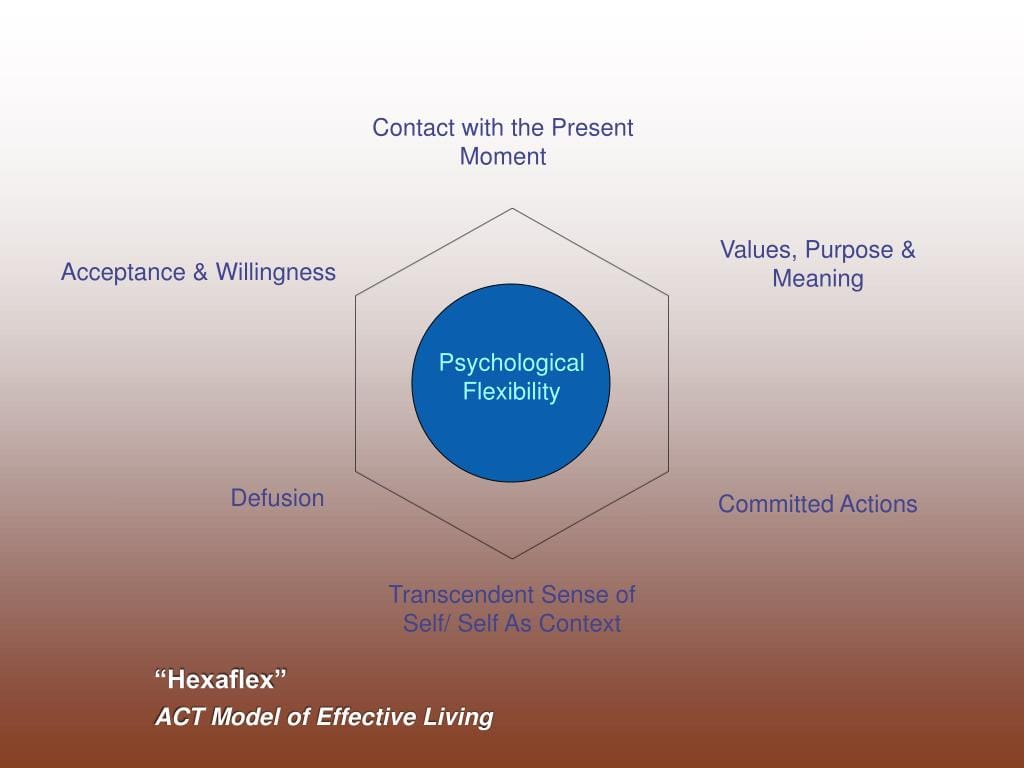The ACT Hexaflex: Six core processes for cultivating psychological flexibility and living a values-driven life. Picture this: life as a dance, sometimes with challenging steps. The ACT Hexaflex is your guidebook, a six-process model from Acceptance and Commitment Therapy (ACT)—a type of therapy that emphasizes acceptance, mindfulness, and values-focused living—teaching you to accept difficult thoughts and feelings, focus on the present, and live a life aligned with your values. Let’s explore how to step into resilience, self-discovery, and a life infused with purpose.
Navigating Life’s Challenges with the ACT Hexaflex
Ever feel stuck in your head, rehashing the past or worrying about the future? Acceptance and Commitment Therapy (ACT) offers a powerful alternative. At its core is the Hexaflex, a roadmap to greater psychological flexibility—your toolkit for navigating life’s ups and downs with grace and resilience. It’s not about eliminating difficult thoughts and feelings; it’s about changing your relationship with them. If you’re into gardening, you must know about this certain plant that has some aerial roots. Check out this article that will tell you everything you need to know about the aerial root monstera.
The ACT Hexaflex consists of six interconnected processes, working together like the strings of an instrument.
Exploring the Six Core Processes
Acceptance: This isn’t about giving up. It’s about making room for uncomfortable thoughts and emotions, acknowledging their presence without judgment. Imagine them like waves: they rise and fall, but you don’t have to be swept away.
Cognitive Defusion: We often believe our thoughts are absolute truths. Cognitive defusion creates distance, recognizing thoughts as mental events—words and images—passing through our minds. It’s like watching clouds drift by.
Being Present (Mindfulness): Cultivate an awareness of the present moment, without judgment. Notice your thoughts, feelings, and sensations as they arise, without getting carried away. Try taking a few deep breaths, paying attention to the air moving in and out of your body.
The Observing Self (Self-as-Context): You are not your thoughts or feelings. You are the awareness that observes them. Think of it like the sky: weather patterns come and go, but the sky remains.
Values: Values are your compass, guiding you toward what truly matters. They’re not about what you should do, but what you want to do. Identifying your values helps you make choices that align with your deeper purpose.
Committed Action: Take consistent steps towards your values, even when facing obstacles. It’s not about perfection, but progress—one step at a time. Try out this technique by playing an engaging game of act hexaflex that will help you understand more about Acceptance and commitment therapy.
Understanding the Interconnectedness of the Hexaflex
The Hexaflex is a dynamic system. These six processes influence and support each other. Acceptance makes it easier to be present, and being present can help you defuse from difficult thoughts. Committed action becomes more sustainable when guided by your values and supported by acceptance and mindfulness.
Putting the Hexaflex into Action
How can you start using the Hexaflex in your life?
Step 1: Explore Your Flexibility: How do you typically respond to difficult thoughts and feelings? Do you fight them, avoid them, or get caught up in them? This reveals where to focus your efforts.
Step 2: Identify Areas for Growth: Which process resonates most? Where could you benefit from greater flexibility? Perhaps you struggle with acceptance, or connecting with your values.
Step 3: Experiment with ACT Techniques: Try mindfulness meditation, defusion techniques (labeling thoughts as “just thoughts”), and values clarification exercises. Start small.
Step 4: Track Your Progress: Notice how you respond to challenges over time. Are you noticing shifts in your relationship with your thoughts and feelings? Are you taking more committed action? Be patient; it’s a journey.
The Science and Potential of ACT
Research on ACT is promising, suggesting it’s effective for various challenges, from anxiety and depression to chronic pain. However, everyone’s experience is unique. What works for one might not work for another. Ongoing research explores the mechanisms by which ACT works and identifies specific populations who might benefit most. ACT is not a quick fix but an ongoing process. If you are interested in learning more, many resources are available, including books, websites, and workshops.
The 4 A’s of ACT: A Deeper Dive into Acceptance
Within the broader framework of the ACT Hexaflex, the 4 A’s offer a more focused approach to developing acceptance skills. These A’s are:
Acknowledge: Notice your inner experiences—thoughts, feelings, sensations—without judgment. Simply say, “This is here.”
Allow: Let these experiences be present without struggling against them. It’s okay to feel what you’re feeling.
Accommodate: Adjust your actions and behaviors around these experiences, not because of them. Live in line with your values, even when discomfort is present.
Appreciate: Recognize the potential for growth and insight, even in difficult experiences.
The 4 A’s work together, promoting acceptance and defusion of thoughts, which facilitates values-based living. This can lead to reduced emotional reactivity, improved coping skills, and increased well-being. They are not a standalone solution but a valuable tool within the larger ACT framework.
Key Takeaways and Further Exploration
The ACT Hexaflex and the 4 A’s offer valuable tools for cultivating psychological flexibility and navigating life’s challenges. Remember, this is an ongoing process of learning and growth. While research suggests ACT’s effectiveness, individual experiences may vary. If you’re interested in learning more, explore resources from reputable organizations and professionals.
- Senior at What Age: Benefits & Eligibility Guide - March 29, 2025
- Unlocking Senior Benefits: How Old is a Senior? Your Complete Guide - March 29, 2025
- Master Russian Politeness:A Guide to Saying Please - March 29, 2025
















